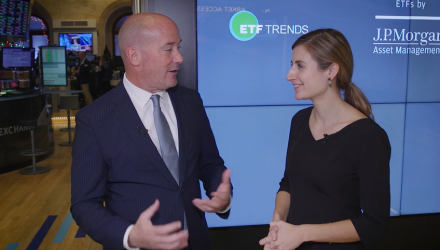Investors are picking themselves up in 2019 after a tumultuous way to end 2018. The Dow Jones Industrial Average fell 5.6 percent, while the S&P 500 was down 6.2 percent and the Nasdaq Composite declined 4 percent.
2018 marked the worst year for stocks since 2008 and only the second year the Dow and S&P 500 fell in the past decade. In 2019, investors are no doubt reassessing their strategies for how to distribute their capital through the rest of the year.
In this latest “In The Know” update featuring market themes and opportunities, Samantha Azzarello, Global Market Strategist at JP Morgan ETFs, discussed opportunities investors can look to for guidance in 2019, particularly when it comes to fixed income.
As markets have cycled out of the growth and momentum-fueled investments of 2019, a move to more quality-oriented investments are in order. Identifying these quality-based investments, however, will require more due diligence.
“We’re at the beginning of late stages,” said Azzarello. “I think what that means is a lot more volatility. We maybe want to have a bias to quality. We want to be very selective because we think with the end in sight, there’s an element of protection to have in portfolios.”
“In equities, it means good quality balance sheets, strong management, the ability to pay out a dividend, everyone loves income,” added Azzarello.
Getting Strategic with Fixed Income
The end of 2018 also spurred a move to bonds as investors sought after safe-haven alternatives amid the volatility. One corner of the bond market that especially saw an influx of capital was short duration bonds.
While shorter durations still have a place in fixed income portfolios, Azzarello also feels more duration can help shore up portfolios–a plus during times of volatility.
“I think the appeal of short duration in 2018 is going to continue in 2019,” said Azzarello. “Being able to get a little bit of income on that short end of the curve—we still think that’s important. However, we’re also saying you need to have a little more duration in at least a part of the portfolio just to have a balance, just to have protection if volatility hits.
The default bond play to get broad-based exposure might be the iShares Core US Aggregate Bond ETF (NYSEArca: AGG), which tracks the investment results of the Bloomberg Barclays U.S. Aggregate Bond Index. The AGG gives bond investors general exposure to the fixed income markets, but there are times when current market conditions warrant a deconstruction of the AGG to extract maximum investor benefit–one area Azzarello suggests is active fixed income.
